.
![Grasses | by efo]()
![Grasses | by efo]()
![]()
porchflag (DesMoines, Iowa): photo by greg (It'sGreg), 6 April 2014
![]()
Killer blob (Los Angeles): photo by anotherswede ON A BREAK, 7 July 2013
![]()
Bomb squad says Central Park explosion may have been caused by abandoned homemade fireworks Photo by Andrew Kelly/Reuters: image via NYT Metro Desk @NYTMetro, 3 July 2016
![]()
Nearly 120 killed in overnight Baghdad bombings claimed by Islamic State: image via Reuters Top News @Reuters, 3 July 2016
![]()
Top lawmakers pretend to be confident in fairness of Clinton email probe: image via Reuters Top News @Reuters, 3 July 2015
![]()
![]()
![]()
![]()
![http://lcweb2.loc.gov/service/pnp/fsa/8a30000/8a30300/8a30303v.jpg]()
Motorcycle club member painting a sign on the Fourth of July
![http://lcweb2.loc.gov/service/pnp/fsa/8a30000/8a30200/8a30294r.jpg]()
Motorcycle racers
.![http://lcweb2.loc.gov/service/pnp/fsa/8a30000/8a30200/8a30272r.jpg]()
Motorcycle riders at the Fourth of July celebration
![http://lcweb2.loc.gov/service/pnp/fsa/8a30000/8a30200/8a30282r.jpg]()
Motorcycle club boys rough-housing
![http://lcweb2.loc.gov/service/pnp/fsa/8a30000/8a30300/8a30305r.jpg]()
A grass fire breaks out on the Fourth of July
![http://lcweb2.loc.gov/service/pnp/fsa/8a30000/8a30300/8a30313v.jpg]()
Grass fire on the Fourth of July
![http://lcweb2.loc.gov/service/pnp/fsa/8a30000/8a30300/8a30314v.jpg]()
Grass fire on the Fourth of July
![http://lcweb2.loc.gov/service/pnp/fsa/8a30000/8a30300/8a30309r.jpg]()
Fighting a grass fire on Fourth of July
![http://lcweb2.loc.gov/service/pnp/fsa/8a30000/8a30300/8a30308r.jpg]()
Fighting a grass fire on Fourth of July
![http://lcweb2.loc.gov/service/pnp/fsa/8a30000/8a30300/8a30307r.jpg]()
Fighting a grass fire on Fourth of July
![http://lcweb2.loc.gov/service/pnp/fsa/8a30000/8a30200/8a30277r.jpg]()
Tired picnickers
![http://lcweb2.loc.gov/service/pnp/fsa/8a30000/8a30300/8a30301v.jpg]()
Interlude, after watching the Fourth of July parade
![http://lcweb2.loc.gov/service/pnp/fsac/1a34000/1a34200/1a34297v.jpg]()
Fourth of July celebration, St. Helena Island, South Carolina
![http://lcweb2.loc.gov/service/pnp/fsac/1a34000/1a34200/1a34299v.jpg]()
A Fourth of July celebration, St. Helena Island, South Carolina
![http://lcweb2.loc.gov/service/pnp/fsac/1a34000/1a34300/1a34301v.jpg]()
Fourth of July picnic, St. Helena Island, South Carolina
![http://lcweb2.loc.gov/service/pnp/fsac/1a34000/1a34300/1a34303v.jpg]()
A Fourth of July celebration, St. Helena Island, South Carolina
![http://lcweb2.loc.gov/service/pnp/fsac/1a34000/1a34200/1a34296v.jpg]()
A Fourth of July celebration, St. Helena Island, South Carolina
![http://lcweb2.loc.gov/service/pnp/fsac/1a34000/1a34200/1a34298v.jpg]()
A Fourth of July picnic, St. Helena Island, South Carolina
![http://lcweb2.loc.gov/service/pnp/fsac/1a34000/1a34300/1a34300v.jpg]()
A Fourth of July celebration, St. Helena Island, South Carolina
![http://lcweb2.loc.gov/service/pnp/fsac/1a34000/1a34300/1a34302v.jpg]()
A Fourth of July celebration, St. Helena Island, South Carolina
![http://lcweb2.loc.gov/service/pnp/fsac/1a34000/1a34300/1a34304v.jpg]()
A Fourth of July celebration, St. Helena Island, South Carolina
![http://lcweb2.loc.gov/service/pnp/ppmsc/02000/02026v.jpg]()
Eskimo highkick, Nome, Alaska, 6 ft. 5 in., July 4th, 1915: photo by Butler Mauro Company, Nome (Library of Congress)
![http://lcweb2.loc.gov/service/pnp/ppmsc/01800/01867v.jpg]()
Visitors arriving for July 4th celebration, Fairbanks, Alaska, 1916: photo by Johnson (Frank and Frances Carpenter Collection, Library of Congress).
![http://lcweb2.loc.gov/service/pnp/ppmsc/01600/01647v.jpg]()
July 4th parade, Nome, Alaska, 1916: photographer unknown, from the collection of Frank G. Carpenter (Frank and Frances Carpenter Collection, Library of Congress)
![http://lcweb2.loc.gov/service/pnp/ppmsc/02400/02486v.jpg]()
July 4th parade, Nome, Alaska, 1915: photographer unknown, from the collection of Frank G. Carpenter (Frank and Frances Carpenter Collection, Library of Congress)
![http://lcweb2.loc.gov/service/pnp/cph/3b10000/3b16000/3b16800/3b16873r.jpg]()
Tug-of-war, Fourth of July, Skagway, Alaska: photo by Frank G. Carpenter, between 1900 and 1916 (Frank and Frances Carpenter Collection, Library of Congress)
![http://lcweb2.loc.gov/service/pnp/cph/3b10000/3b16000/3b16800/3b16872r.jpg]()
Fourth of July, Skagway, Alaska, group of spectators gathered to watch tug-of-war contest in the street: photo by Frank G. Carpenter, between 1900 and 1916 (Frank and Frances Carpenter Collection, Library of Congress)
![http://lcweb2.loc.gov/service/pnp/ppmsc/01800/01892v.jpg]()
Chariot race at 4th of July celebration, Fairbanks, Alaska: photographer unknown, between c. 1900 and c. 1930, from the collection of Frank G. Carpenter (Frank and Frances Carpenter Collection, Library of Congress)
![http://lcweb2.loc.gov/service/pnp/ppmsc/02600/02678v.jpg]()
The Race. Two small teams of Chinese runners pull a hose down the main street in the Great Hub-and-Hub race at Deadwood, Dakota, July 4, 1888, between the only two Chinese hose teams in the United States: photo by John C. Grabill, 4 July 1888 (John C.H. Grabill Collection, Library of Congress)
![http://lcweb2.loc.gov/service/pnp/ppmsca/26100/26179v.jpg]()
The annual pleasantry: Udo J. Keppler (1872-1956), from Puck, v. 61, no. 1582, 26 June 1907 (Library of Congress)
![http://lcweb2.loc.gov/service/pnp/pga/01500/01597v.jpg]()
The pic nic on the Fourth of July. A day to be remembered: Lilly M. Spencer, engraved by Samuel Hollyer, 1864 (Library of Congress)
![http://lcweb2.loc.gov/service/pnp/cph/3b40000/3b42000/3b42600/3b42621r.jpg]()
Inaugurating the glorious Fourth: C. S. Reinhart, from a sketch by H. N. Cady, in Harpers Weekly, 13 July 1878 (Library of Congress)
![http://lcweb2.loc.gov/service/pnp/cph/3b30000/3b39000/3b39800/3b39851r.jpg]()
Fourth of July parade at Takoma Park, Maryland, 1923: photographer unknown (National Photo Company Collection, Library of Congress)
![http://lcweb2.loc.gov/service/pnp/ppmsca/26200/26285v.jpg]()
Independence Day: Udo J. Keppler, from Puck, v. 63, no. 1635, 1 July 1908 (Library of Congress)

Grasses (Vallejo, California): photo by efo, 3 July 2016

Grasses (Vallejo, California): photo by efo, 3 July 2016
Robert Creeley: America

porchflag (DesMoines, Iowa): photo by greg (It'sGreg), 6 April 2014
America, you ode for reality!
Give back the people you took.
Let the sun shine again
on the four corners of the world
you thought of first but do not
own, or keep like a convenience.
People are your own word, you
invented that locus and term.
Here, you said and say, is
where we are. Give back
what we are, these people you made,
us, and nowhere but you to be.
Give back the people you took.
Let the sun shine again
on the four corners of the world
you thought of first but do not
own, or keep like a convenience.
People are your own word, you
invented that locus and term.
Here, you said and say, is
where we are. Give back
what we are, these people you made,
us, and nowhere but you to be.
Robert Creeley (1929-2005): America, from Pieces (1969)

Killer blob (Los Angeles): photo by anotherswede ON A BREAK, 7 July 2013
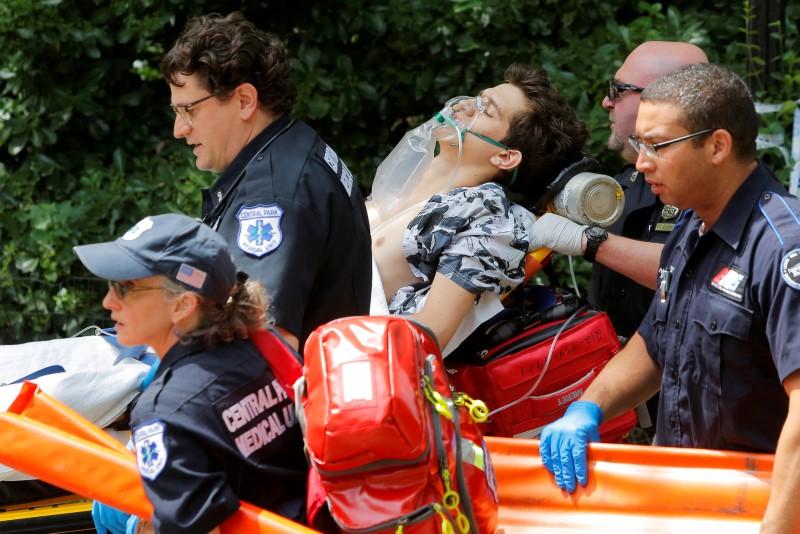
Tourist badly hurt by blast from homemade firework in New York's Central Park: image via Reuters Top News @Reuters, 3 July 2016
Tourist badly hurt by blast from homemade firework in New York's Central Park: Barbara Goldberg, Reuters, 3 July 2016
A 19-year-old tourist in Manhattan's Central Park suffered a severe foot wound on Sunday after an apparent homemade firework exploded when he jumped off a rock and stepped on the device, authorities said.
Police said there was no reason to suspect that the blast, on the eve of Fourth of July celebrations, was the work of extremists or that the explosive object had been designed to hurt anyone.
Investigators said the object was likely fabricated by an amateur fireworks enthusiast for the thrill of creating a loud noise and flash. At least one bystander in the park told CNN the blast sounded "like a cannon."
Photographs of the injured man, who police said was visiting from Virginia with two friends, showed his left foot bandaged and badly mangled as he was being treated by emergency medical technicians on the scene.
The man was taken to Bellevue Hospital, where police said he was undergoing surgery and was listed in serious but stable condition. His two companions, aged 18 and 20, were not injured. None was believed to have had anything to do with making the device.
The late-morning explosion occurred when all three men jumped off a rock and the victim landed on top of the object, which had been stashed near the boulder out of the way of normal foot traffic, police said.
"At this time, we have no evidence this is related to terrorism," NYPD Deputy Chief John O'Connell told reporters in the park, adding there were "no specific credible threats directed at New York or the July Fourth celebrations."
Lieutenant Mark Torre, commander of the police bomb squad, said there was nothing to indicate the device was "put in this area with a specific intent to harm any individual" and that evidence showed it was not meant to be detonated by someone stepping on it.
He said the device, which was believed to have been in the park for at least a day, "may have not gone off at an earlier time and was just left there."
The 778-acre (315-hectare) park in the heart of Manhattan is a major draw for tourists visiting New York City. The park remained open to visitors following the blast.
But police were checking for any additional explosives in the park, using dogs trained to detect vapor trails left behind by explosives or would-be bombers.
Teams of so-called Vapor Wake Detection dogs were being deployed in New York for the first time as part of stepped-up measures to protect America's most populous city during the holiday weekend.
The enhanced security comes amid heightened U.S. vigilance against potential assaults on public places following deadly attacks during the past week on a Bangladesh cafe, claimed by Islamic State, and at Istanbul's main airport blamed on the militant group.
Police said there was no reason to suspect that the blast, on the eve of Fourth of July celebrations, was the work of extremists or that the explosive object had been designed to hurt anyone.
Investigators said the object was likely fabricated by an amateur fireworks enthusiast for the thrill of creating a loud noise and flash. At least one bystander in the park told CNN the blast sounded "like a cannon."
Photographs of the injured man, who police said was visiting from Virginia with two friends, showed his left foot bandaged and badly mangled as he was being treated by emergency medical technicians on the scene.
The man was taken to Bellevue Hospital, where police said he was undergoing surgery and was listed in serious but stable condition. His two companions, aged 18 and 20, were not injured. None was believed to have had anything to do with making the device.
The late-morning explosion occurred when all three men jumped off a rock and the victim landed on top of the object, which had been stashed near the boulder out of the way of normal foot traffic, police said.
"At this time, we have no evidence this is related to terrorism," NYPD Deputy Chief John O'Connell told reporters in the park, adding there were "no specific credible threats directed at New York or the July Fourth celebrations."
Lieutenant Mark Torre, commander of the police bomb squad, said there was nothing to indicate the device was "put in this area with a specific intent to harm any individual" and that evidence showed it was not meant to be detonated by someone stepping on it.
He said the device, which was believed to have been in the park for at least a day, "may have not gone off at an earlier time and was just left there."
The 778-acre (315-hectare) park in the heart of Manhattan is a major draw for tourists visiting New York City. The park remained open to visitors following the blast.
But police were checking for any additional explosives in the park, using dogs trained to detect vapor trails left behind by explosives or would-be bombers.
Teams of so-called Vapor Wake Detection dogs were being deployed in New York for the first time as part of stepped-up measures to protect America's most populous city during the holiday weekend.
The enhanced security comes amid heightened U.S. vigilance against potential assaults on public places following deadly attacks during the past week on a Bangladesh cafe, claimed by Islamic State, and at Istanbul's main airport blamed on the militant group.
Bomb squad says Central Park explosion may have been caused by abandoned homemade fireworks Photo by Andrew Kelly/Reuters: image via NYT Metro Desk @NYTMetro, 3 July 2016
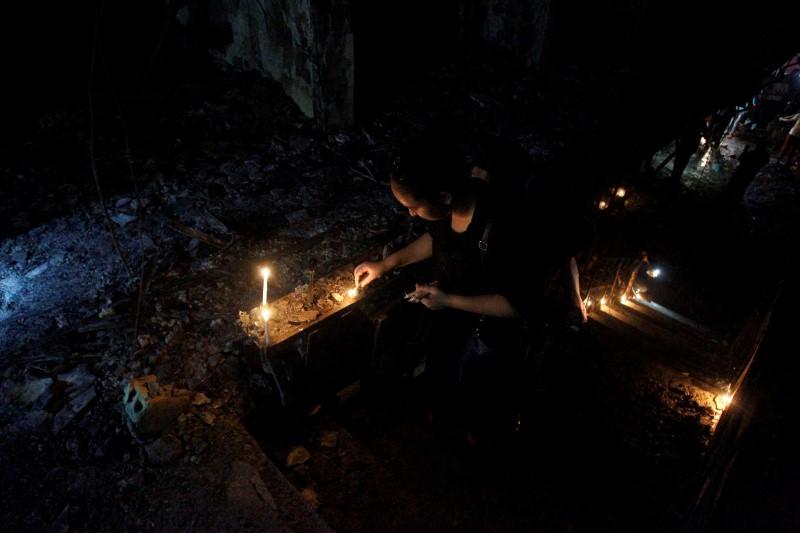
Nearly 120 killed in overnight Baghdad bombings claimed by Islamic State: image via Reuters Top News @Reuters, 3 July 2016
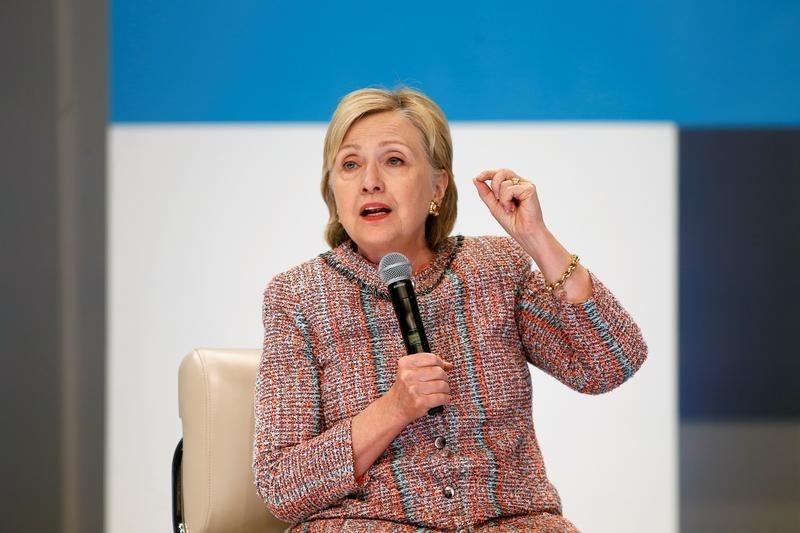
Top lawmakers pretend to be confident in fairness of Clinton email probe: image via Reuters Top News @Reuters, 3 July 2015

Hillary Clinton and her tireless army of understandably stressed-out, acrobatically overcompensating campaign stand-ins (or HillBots) can't seem to stop talking about trust: image via AP Politics @AP_Politics, 3 July 2016
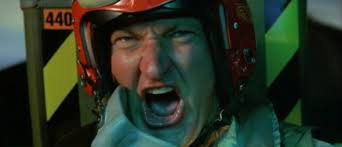
I hope all of you ungrateful millennials remember tomorrow the sacrifices that were made for you #IndependenceDay: image via Bob Owens @bob_owens, 3 July 2016
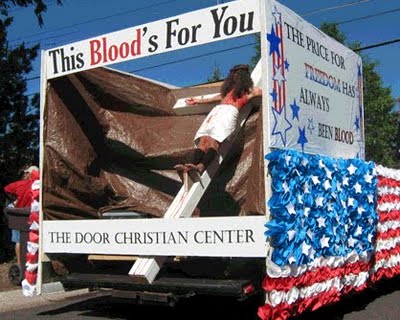
On the other hand... Here's one way to spend the #FourthofJuly: image via Christian Nightmares @ChristnNitemare, 3 July 2016
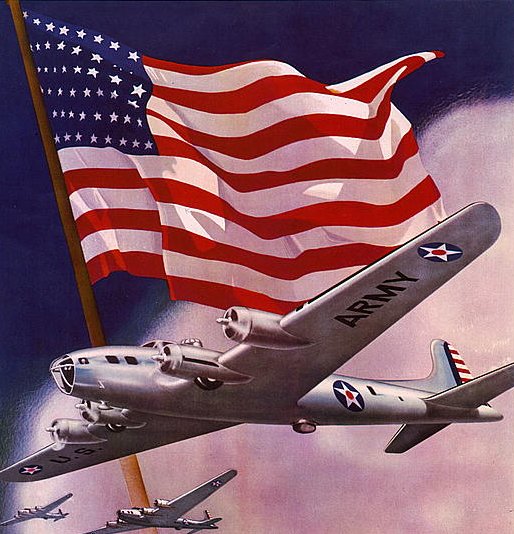
For #IndependenceDay: Flag standards, etiquette and use, from our In Custodia Legis blog: image via Library of Congress verified account @librarycongress, 3 July 2016
Russell Lee: Vale, Oregon, Fourth of July 1941
![http://lcweb2.loc.gov/service/pnp/fsa/8a30000/8a30100/8a30185v.jpg]()
Citizens of Vale, Oregon take off their hats during the Pledge of Allegiance (radio program) on the Fourth of July
![http://lcweb2.loc.gov/service/pnp/fsa/8c01000/8c01600/8c01692r.jpg]()
Ride at the carnival which was part of the Fourth of July celebration at Vale, Oregon
![http://lcweb2.loc.gov/service/pnp/fsa/8c36000/8c36600/8c36614r.jpg]()
Main street of Vale, Oregon, on the Fourth of July. Vale is one of the shopping centers for the farmers who live and work on the Vale-Owyhee irrigation project.
![http://lcweb2.loc.gov/service/pnp/fsa/8c01000/8c01600/8c01673r.jpg]()
One of the floats in the Fourth of July parade, at Vale, Oregon. All floats were of a patriotic nature this year.
![http://lcweb2.loc.gov/service/pnp/fsa/8c01000/8c01600/8c01686r.jpg]()
Ride at the carnival which was part of the Fourth of July celebration
![http://lcweb2.loc.gov/service/pnp/fsa/8c01000/8c01600/8c01688r.jpg]()
Baseball game, part of the Fourth of July celebration at Vale, Oregon. The annual Fourth of July celebration has been held in Vale, Malheur County, Oregon, for many years. Formerly the rodeo has been one of the chief attractions, but this section has changed from an exclusively cattleman's country to one of farmers since the Vale-Owyhee irrigation project has attracted farmers principally from the Dust Bowl areas. This year for the first time there was no rodeo and the baseball game became the prime attraction.
![http://lcweb2.loc.gov/service/pnp/fsa/8c01000/8c01600/8c01666r.jpg]()
"Batter up" at the baseball game which was part of the Fourth of July celebration at Vale, Oregon
![http://lcweb2.loc.gov/service/pnp/fsa/8c01000/8c01600/8c01676r.jpg]()
Kids' tug of war at the Fourth of July celebration at Vale, Oregon.
![http://lcweb2.loc.gov/service/pnp/fsa/8c01000/8c01600/8c01699r.jpg]()
Tug of war at the Fourth of July celebration
![http://lcweb2.loc.gov/service/pnp/fsa/8a30000/8a30200/8a30295r.jpg]()
Greased pig race, Fourth of July
![http://lcweb2.loc.gov/service/pnp/fsa/8c01000/8c01600/8c01680r.jpg]()
Father with his two daughters on the merry-go-round, one of the carnival attractions at the Fourth of July celebrations
![http://lcweb2.loc.gov/service/pnp/fsa/8c01000/8c01600/8c01670r.jpg]()
Men gathered around one of the carnival attractions in Vale, Oregon, at the Fourth of July celebration
![http://lcweb2.loc.gov/service/pnp/fsa/8a30000/8a30200/8a30286r.jpg]()
Fireworks for sale
![http://lcweb2.loc.gov/service/pnp/fsa/8a30000/8a30300/8a30326r.jpg]()
Fourth of July carnival
l![http://lcweb2.loc.gov/service/pnp/fsa/8a30000/8a30300/8a30328r.jpg]()
Lunch at carnival stand
![http://lcweb2.loc.gov/service/pnp/fsa/8a30000/8a30200/8a30288r.jpg]()
Boys at Fourth of JulyCarnival
![http://lcweb2.loc.gov/service/pnp/fsa/8a30000/8a30300/8a30311r.jpg]()
Cold drinks on the Fourth of July
![http://lcweb2.loc.gov/service/pnp/fsa/8a30000/8a30300/8a30324r.jpg]()
Police officer, Fourth of July
![http://lcweb2.loc.gov/service/pnp/fsa/8c01000/8c01600/8c01668r.jpg]()
Sign in Riverside Park at Vale, Oregon. The picnic on the Fourth of July was in this park. Most of the farmers in this predominantly agricultural area are from the Dust Bowl states and the church has strong influence.
![http://lcweb2.loc.gov/service/pnp/fsa/8a30000/8a30300/8a30302r.jpg]()
Youngsters in the park on Fourth of July
![http://lcweb2.loc.gov/service/pnp/fsa/8a30000/8a30200/8a30268r.jpg]()
Picnic on the Fourth of July
![http://lcweb2.loc.gov/service/pnp/fsa/8a30000/8a30200/8a30270r.jpg]()
Picnic on the Fourth of July

Citizens of Vale, Oregon take off their hats during the Pledge of Allegiance (radio program) on the Fourth of July

Ride at the carnival which was part of the Fourth of July celebration at Vale, Oregon

Main street of Vale, Oregon, on the Fourth of July. Vale is one of the shopping centers for the farmers who live and work on the Vale-Owyhee irrigation project.

One of the floats in the Fourth of July parade, at Vale, Oregon. All floats were of a patriotic nature this year.

Ride at the carnival which was part of the Fourth of July celebration

Baseball game, part of the Fourth of July celebration at Vale, Oregon. The annual Fourth of July celebration has been held in Vale, Malheur County, Oregon, for many years. Formerly the rodeo has been one of the chief attractions, but this section has changed from an exclusively cattleman's country to one of farmers since the Vale-Owyhee irrigation project has attracted farmers principally from the Dust Bowl areas. This year for the first time there was no rodeo and the baseball game became the prime attraction.

"Batter up" at the baseball game which was part of the Fourth of July celebration at Vale, Oregon

Kids' tug of war at the Fourth of July celebration at Vale, Oregon.

Tug of war at the Fourth of July celebration

Greased pig race, Fourth of July

Father with his two daughters on the merry-go-round, one of the carnival attractions at the Fourth of July celebrations

Men gathered around one of the carnival attractions in Vale, Oregon, at the Fourth of July celebration

Fireworks for sale

Fourth of July carnival
l

Lunch at carnival stand

Boys at Fourth of JulyCarnival

Cold drinks on the Fourth of July

Police officer, Fourth of July

Sign in Riverside Park at Vale, Oregon. The picnic on the Fourth of July was in this park. Most of the farmers in this predominantly agricultural area are from the Dust Bowl states and the church has strong influence.

Youngsters in the park on Fourth of July

Picnic on the Fourth of July

Picnic on the Fourth of July

Motorcycle club member painting a sign on the Fourth of July

Motorcycle racers
.

Motorcycle riders at the Fourth of July celebration

Motorcycle club boys rough-housing

A grass fire breaks out on the Fourth of July

Grass fire on the Fourth of July

Grass fire on the Fourth of July

Fighting a grass fire on Fourth of July

Fighting a grass fire on Fourth of July

Fighting a grass fire on Fourth of July

Tired picnickers

Interlude, after watching the Fourth of July parade
All photos by Russell Lee (1903-1986), Vale, Malheur County, Oregon, July 1941 (Farm Security Administration/Office of War Administration Collection, Library of Congress)
Marion Post Wolcott: A Fourth of July Celebration, St. Helena Island, South Carolina, 1941

Fourth of July celebration, St. Helena Island, South Carolina

A Fourth of July celebration, St. Helena Island, South Carolina

Fourth of July picnic, St. Helena Island, South Carolina

A Fourth of July celebration, St. Helena Island, South Carolina

A Fourth of July celebration, St. Helena Island, South Carolina

A Fourth of July picnic, St. Helena Island, South Carolina

A Fourth of July celebration, St. Helena Island, South Carolina

A Fourth of July celebration, St. Helena Island, South Carolina

A Fourth of July celebration, St. Helena Island, South Carolina
All photos by Marion Post Wolcott (1910-1990), St. Helena Island, South Carolina, July 1939 (Farm Security Administration/Office of War Administration Collection, Library of Congress)
Fourth of July, Great White North
Eskimo highkick, Nome, Alaska, 6 ft. 5 in., July 4th, 1915: photo by Butler Mauro Company, Nome (Library of Congress)

Visitors arriving for July 4th celebration, Fairbanks, Alaska, 1916: photo by Johnson (Frank and Frances Carpenter Collection, Library of Congress).

July 4th parade, Nome, Alaska, 1916: photographer unknown, from the collection of Frank G. Carpenter (Frank and Frances Carpenter Collection, Library of Congress)

July 4th parade, Nome, Alaska, 1915: photographer unknown, from the collection of Frank G. Carpenter (Frank and Frances Carpenter Collection, Library of Congress)

Tug-of-war, Fourth of July, Skagway, Alaska: photo by Frank G. Carpenter, between 1900 and 1916 (Frank and Frances Carpenter Collection, Library of Congress)

Fourth of July, Skagway, Alaska, group of spectators gathered to watch tug-of-war contest in the street: photo by Frank G. Carpenter, between 1900 and 1916 (Frank and Frances Carpenter Collection, Library of Congress)

Chariot race at 4th of July celebration, Fairbanks, Alaska: photographer unknown, between c. 1900 and c. 1930, from the collection of Frank G. Carpenter (Frank and Frances Carpenter Collection, Library of Congress)

The Race. Two small teams of Chinese runners pull a hose down the main street in the Great Hub-and-Hub race at Deadwood, Dakota, July 4, 1888, between the only two Chinese hose teams in the United States: photo by John C. Grabill, 4 July 1888 (John C.H. Grabill Collection, Library of Congress)
D. H. Lawrence: Independence Day (the annual pleasantry)

The annual pleasantry: Udo J. Keppler (1872-1956), from Puck, v. 61, no. 1582, 26 June 1907 (Library of Congress)
Let us look at this American artist first. How did he ever get to America, to start with? Why isn't he a European still, like his father before him?
Now listen to me, don't listen to him. He'll tell you the lie you expect. Which is partly your fault for expecting it.
He didn't come in search of freedom of worship. England had more freedom of worship in the year 1700 than America had. Won by Englishmen who wanted freedom, and so stopped at home and fought for it. And got it. Freedom of worship? Read the history of New England during the first century of its existence.

The pic nic on the Fourth of July. A day to be remembered: Lilly M. Spencer, engraved by Samuel Hollyer, 1864 (Library of Congress)
Freedom anyhow? The land of the free! This the land of the free! Why, if I say anything that displeases them, the free mob will Iynch me, and that's my freedom. Free? Why, I have never been in any country where the individual has such an abject fear of his fellow countrymen. Because, as I say, they are free to Iynch the moment he shows he is not one of them.
No, no, if you're so fond of the truth about Queen Victoria, try a little about yourself.
Those Pilgrim Fathers and their successors never came here for freedom of worship. What did they set up when they got here? Freedom, would you call it?

Inaugurating the glorious Fourth: C. S. Reinhart, from a sketch by H. N. Cady, in Harpers Weekly, 13 July 1878 (Library of Congress)
They didn't come for freedom. Or if they did, they sadly went back on themselves.
All right then, what did they come for? For lots of reasons. Perhaps least of all in search of freedom of any sort: positive freedom, that is.
They came largely to get away -- that most simple of motives. To get away. Away from what? In the long run, away from themselves. Away from everything. That's why most people have come to America, and still do come. To get away from everything they are and have been.

Fourth of July parade at Takoma Park, Maryland, 1923: photographer unknown (National Photo Company Collection, Library of Congress)

Independence Day: Udo J. Keppler, from Puck, v. 63, no. 1635, 1 July 1908 (Library of Congress)
D. H. Lawrence (1885-1930): from Chapter 1: The Spirit of Place, in Studies in Classic American Literature, 1923
Fireworks over La Paz, after the election of Evo Morales, 22 January 2006: photo by Alhen, 2006
Welder making boilers for a ship, Combustion Engineering Co. Chattanooga, Tennessee, June 1942: photo by Alfred Palmer, 1942 (Library of Congress)
John Donne: from a Sermon Preached at the Spital Cross by the Hospital of St. Mary, Bishopsgate, Upon Easter-Munday, 22 April 1622
Oil fires outside Kuwait City in the aftermath of Operation Desert Storm: photo by Lietmotiv, 2006
The Divine Comedy, Inferno XIX: The Simoniac Pope: William Blake, 1824-1827 (Tate Gallery, London)
![File:City under siege, waiting for the new year.jpg]()
City under siege, waiting for the new year, Tbilisi, 1 January 2007: photo by Vladimer Shioshvili, 2007
The Divine Comedy, Inferno VII: The Stygian Lake, with Ireful Sinners Fighting: William Blake, 1824-1827 (National Gallery of Victoria, Australia)
New Year celebration, Wroclaw, Poland, 2001: photo by Julo, 2001
![File:Deepwater Horizon offshore drilling unit on fire.jpg]()
Fireboat response crews battling blazing remnants of offshore oil rig Deepwater Horizon, 21 April 2010: photo by US Coast Guard, 2010
Powder Train
Fireworks over La Paz, after the election of Evo Morales, 22 January 2006: photo by Alhen, 2006
Welder making boilers for a ship, Combustion Engineering Co. Chattanooga, Tennessee, June 1942: photo by Alfred Palmer, 1942 (Library of Congress)
Our God is not out of breath, because he hath blown one tempest, and swallowed a Navy: Our God hath not burnt out his eyes, because he hath looked upon a Train of Powder: In the light of Heaven, and in the darkness of hell, he sees alike; he sees not onely all Machinations of hands, when things come to action; but all Imaginations of hearts, when they are in their first Consultations; past, and present, and future, distinguish not his Quando; all is one time to him: Mountains and Vallies, Sea and Land, distinguish not his Ubi; all is one place to him: When I begin, says God to Eli, I will make an end; not onely that all Gods purposes shall have their certain end but that even then, when he begins, he makes an end: from the very beginning, imprints an infallible assurance, that whom he loves, he loves to the end: as a Circle is printed all at once, so his beginning and ending is all one.
John Donne: from a Sermon Preached at the Spital Cross by the Hospital of St. Mary, Bishopsgate, Upon Easter-Munday, 22 April 1622
Oil fires outside Kuwait City in the aftermath of Operation Desert Storm: photo by Lietmotiv, 2006
The Divine Comedy, Inferno XIX: The Simoniac Pope: William Blake, 1824-1827 (Tate Gallery, London)

City under siege, waiting for the new year, Tbilisi, 1 January 2007: photo by Vladimer Shioshvili, 2007
The Divine Comedy, Inferno VII: The Stygian Lake, with Ireful Sinners Fighting: William Blake, 1824-1827 (National Gallery of Victoria, Australia)
New Year celebration, Wroclaw, Poland, 2001: photo by Julo, 2001
I can't put out these fires on the lake the stymied deity cries

Fireboat response crews battling blazing remnants of offshore oil rig Deepwater Horizon, 21 April 2010: photo by US Coast Guard, 2010
I'm not even going to try











